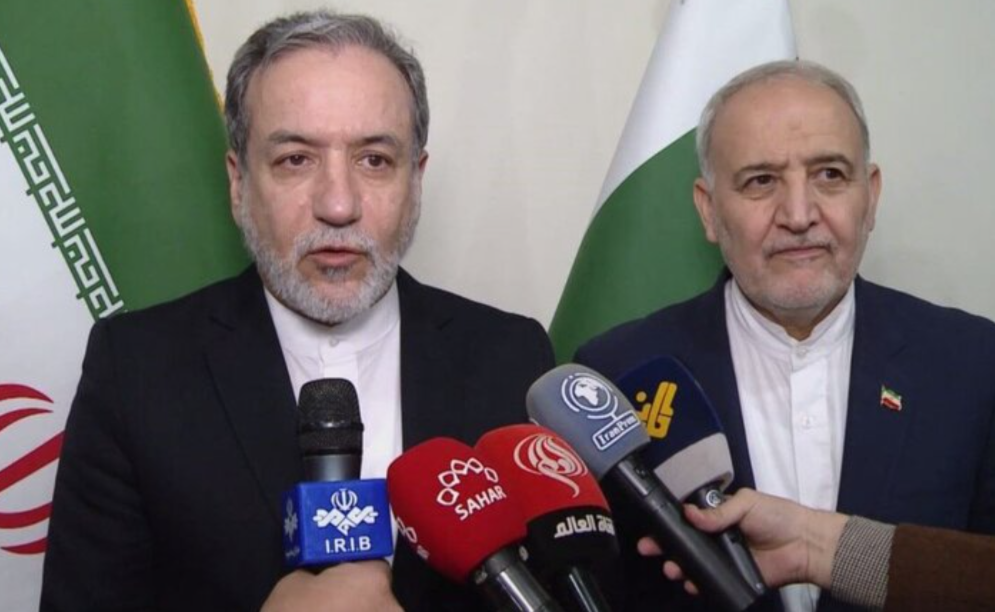Preparation for response to US nuclear proposal underway: Iran's FM
A recent US proposal was presented by US negotiator Steve Witkoff to the Iranian delegation.
-

Iranian Foreign Minister Abbas Araghchi speaks to the media, on June 1, 2025. (Mehr)
Iran’s top nuclear negotiator, Foreign Minister Abbas Araghchi, announced that Tehran is preparing a formal response to a recent proposal presented by US negotiator Steve Witkoff.
Speaking at a cabinet session on Sunday evening, Araghchi confirmed that the proposal had been delivered via Omani Foreign Minister Badr Al Busaidi, who made a brief visit to Tehran.
In a statement posted on X the previous day, Araghchi said Iran would respond to the offer "based on principles, national interests, and the rights of the Iranian people to the proposal."
My dear brother @badralbusaidi, distinguished Foreign Minister of Oman, paid a short visit to Tehran today to present elements of a US proposal which will be appropriately responded to in line with the principles, national interests and rights of the people of Iran. pic.twitter.com/3XyewmFJhD
— Seyed Abbas Araghchi (@araghchi) May 31, 2025
Overnight, Araghchi arrived in the Egyptian capital, Cairo, where he is scheduled to meet with President Abdel Fattah el-Sisi and Foreign Minister Badr Abdel Aaty.
The officials will discuss recent regional developments, efforts to confront the crimes committed by the Israeli occupation in the occupied Palestinian territories, as well as other international issues.
Iran renounces 'domination', 'zero enrichment' rhetoric in US talks
The head of Iran's Atomic Energy Organization (AEOI), Mohammad Eslami, has announced that progress has been achieved in the indirect nuclear talks between Iran and the United States.
Eslami stated on Saturday that there has been some progress in the continuing indirect talks with the US, while opposing the concept of "zero enrichment", describing such conversations as mere hyperbole intended solely for the Zionist community.
Iran’s Foreign Minister Abbas Araghchi emphasized that the country’s right to enrich uranium stems from the "mentality and principle of renouncing foreign domination."
Days ago, Araghchi responded to growing media speculation over a possible Iran-US agreement, emphasizing that while diplomacy remains Tehran’s preferred path, any deal must fully meet Iran’s conditions, chief among them the complete removal of sanctions and recognition of its nuclear rights.
Speaking at Imam Khomeini’s mausoleum on Saturday, he highlighted that Iran’s foreign policy is grounded in resisting both oppression and domination, as outlined in the first article of the Constitution. This principle, he said, has guided the Islamic Republic since its founding.
He noted that “the statement that you should not carry out enrichment is itself domination. Why shouldn’t we have enrichment? This is absolutely unacceptable to the Iranian nation.”
AEOI rejects IAEA report, reaffirms enrichment as Iran's 'red line'
Earlier today, Mohammad Eslami firmly rejected the latest report issued by the International Atomic Energy Agency (IAEA), asserting that Iran is in full compliance with the Safeguards Agreement and the Non-Proliferation Treaty (NPT).
This comes amid growing tensions between Iran and Western powers over its nuclear activities. A confidential IAEA report released on Saturday claimed that Iran had carried out undeclared nuclear work at three sites; Lavisan-Shian, Varamin, and Turquzabad, tied to a clandestine program active until the early 2000s.
The IAEA also reported a sharp increase in Iran’s stockpile of uranium enriched to 60%, which now stands at 408.6 kilograms, a level nearing the threshold for weaponization if enriched further.
Tehran has repeatedly affirmed that nuclear weapons have no place in its defense doctrine, citing a religious decree by the Leader of the Islamic Revolution and the Islamic Republic of Iran, Sayyed Ali Khamenei, as the moral and strategic foundation for its peaceful nuclear stance.
Iran warns E3 against politicizing IAEA report: Exclusive
Iranian political sources told Al Mayadeen two days ago that the E3 countries, France, Germany, and the United Kingdom, are intensifying pressure on the International Atomic Energy Agency (IAEA) to issue a negative report on Iran’s nuclear program, despite recent signs of diplomatic openness from Tehran.
The sources revealed that this pressure campaign began even before the latest round of indirect talks between Tehran and Washington, and has continued unabated, undermining the potential for constructive engagement.
“Despite Iran’s messages of goodwill, the E3 continue to pursue the path of pressuring the IAEA,” the sources stated.
This comes as Western powers plan to push the IAEA to declare Iran in breach of nuclear obligations, marking the first such move in nearly 20 years, escalating tensions despite indirect and direct talks.
Tehran, according to the same sources, conveyed a clear warning to E3 representatives during recent discussions in Istanbul, cautioning that any escalation through the IAEA would have direct consequences on the indirect negotiations with the United States and efforts to reach a sustainable agreement.
“There has been a shift in the atmosphere, and Iran has expressed readiness to send more positive signals,” the sources added. “Yet, the E3's pressure remains unchanged.”

 5 Min Read
5 Min Read









